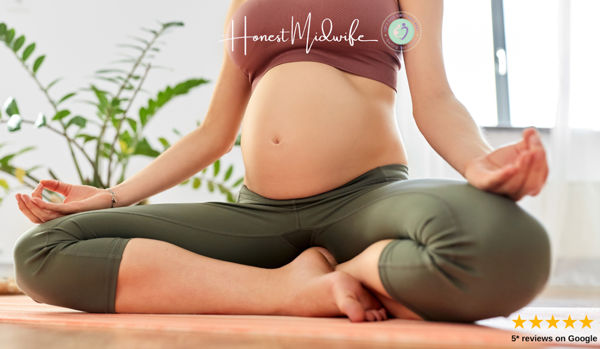One of the most exciting times for new parents when they’re expecting a child is that first moment where they feel their baby kick inside the womb for the first time. However, not many people quite understand what these different movements can mean at different points in the pregnancy road, so here we’re going to give you a quick rundown of what to expect at different times during pregnancy.
First Trimester
So, in the words of ‘The Sound of Music’ let's start at the very beginning...or let’s not. See at the first-trimester stage, you won’t necessarily feel any movement, despite the masses of development happening at this point. Your baby will be too small and too protected to make any kind of an impact yet, so they could be doing the foetal cha-cha and you wouldn’t feel a thing at this stage...sorry!
Second Trimester
LET’S GET READY TO RUMBLE! Or to be more accurate...LET’S GET READY TO THUMB SUCK! It hasn’t quite got the same ring to it, has it? Now’s where the action begins, so let’s break this down a bit.
The first movements that mum will feel are usually between weeks 18 and 22, but can be spread further between weeks 14 and 26. One thing, odd though it may be, to consider, is that the direction the placenta is facing can mean you have to wait for longer to feel the kicks, if the placenta is facing front, the movements of your little one can be muffled meaning you don’t feel them till later. Putting it simply, months four and five are where you are most likely to start feeling things. If however, by the middle of month five, you are yet to feel anything, make an appointment with your doctor, as, although it could be simply an incorrect due date, it is best to make sure everything is ok at this point.
Now then, month six! This is the point where your baby picks up the pace, just like the 24-hour mark after a night out this is the point where things become that bit more coordinated and regular, you may even notice some patterns forming in the way their feet move.
Third Trimester
So now, onto the big one, the third trimester! This is where the real fun begins, as now you can expect foetal activity practically every day! This, however, does bring some extra jobs for you to make sure all is ok, the most important of which being counting the kicks, which I’m going to break down for you now.
Counting the Kicks
So very simply, twice a day, you need to set aside some quiet time to count kicks, these times should be once in the morning, when foetal kicks are less frequent, and one in the evening, as at this time there is an increase in baby’s movements.
Then what you need to do is check the clock (it may be easier for your sake to start at a memorable time rather than a random minute within the hour) and then start counting the kicks, once your little one has kicked 10 times, check the time again. If there have been 10 kicks within an hour, then that is perfectly fine. If there have not been 10 kicks within an hour, have a snack or some juice of some kind and lie down, then continue counting. If 10 kicks aren’t reached within 2 hours total, then contact your doctor, this does not necessarily mean that something is wrong, but it is good to check. Another thing to consider is that the closer you are to your due date, the more this needs to be checked. You will want to count several times a day by month 9, and tell your doctor if you see any sudden decreases.
Anyway, back to the third trimester of kicks…
By around the month seven mark, your baby will be big, but not big enough to have run out of room in your womb. Don’t, however, think this means that the kicks will still be light, by this point the kicks will be more like full-on jolts of your body, as your little baby...is not really so little any more.
Month eight comes around, and at this point, there’s virtually no space left for your little one to play in, meaning they begin trying to play with you. Whether it is playing the bongos on your belly or making you aware of their knees, your little one is discovering just how much their body can do and your belly is the canvas for these discoveries, fun right? For some, these kinds of movements can be painful, if this is the case, try changing your position, from sitting to standing, sitting to lying, etc. as this should move the baby as you move, relieving you of their painful play.
So, the big one, month nine! If it’s any kind of bliss, your (not so) little one is now too big to do any of the constant punching and kicking they had been subjecting your to for the last 4 or so months...because now the movements they’re making are in fact much bigger! Things such as turning over and pounding the cervix can cause a great deal of pain, but can be dealt with by a simple nudge or a changing of position.
Before Labour
When the baby engages (drops head down into the pelvis) the activity can change again. The most important thing is that they now can’t dig their legs into your ribs, hallelujah! Although now you can feel every movement of their head quite strongly. In the last few weeks before delivery, things can vary massively, some babies slow down in their amount of movement, whilst others keep up the energetic act that keeps you painfully aware that they are waiting to come out. During this period you should still be counting kicks and as previously mentioned tell your doctor if you see a sudden decrease.
If there are two main points to emphasise from all this it would be these, firstly, if your baby’s movements are becoming painful, then remember to try changing positions, or if later on in the pregnancy you can always try a gentle nudge. And secondly, count the kicks, this should become a part of your routine in the build-up to your due date and remember to tell your doctor if there is a concerning decrease. And just to add a final point, as much as the kicks and the punches can be painful, remember to cherish the memory of these times as one of the positive moments of the pregnancy, because what would you rather remember the image of, you and your partner touching your belly as you feel your little one kick inside you, or you crouched over your toilet in your bathroom with your partner holding your hair back as you hurl thanks to that blissful asshole of a thing that is pregnancy!
For more information about baby’s movements please visit Kicks Count (https://www.kickscount.org.uk/)
Relax and prepare for labour from the comfort of home, suitable for all levels. Includes breathing techniques to assist in labour & postures to release tension.




